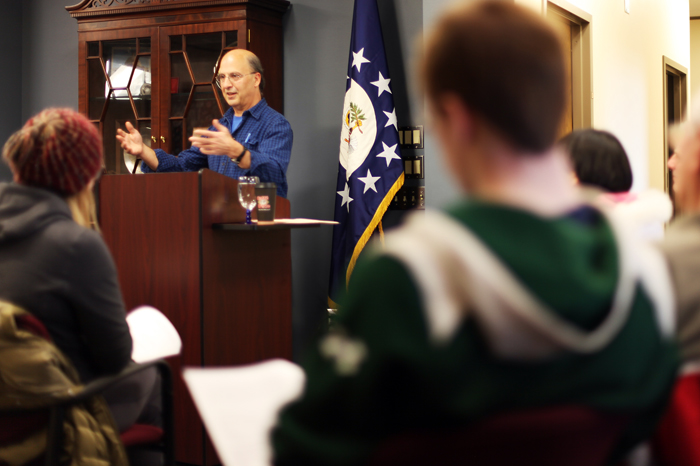Philosophy professor debunks autonomy at Coffee and Politics lecture
Alfred Mele speaks to students about moral autonomy in the first Coffee and Politics lecture of the semester in Bryan Hall 308, Friday, Jan. 24.
January 27, 2014
People’s ability to choose between right and wrong is often prompted by exterior forces, one philosophy professor said.
Alfred Mele, a Florida State University professor of philosophy, delivered his interpretation of how humans react in conditioned environments in the Foley Institute’s spring opener for the Coffee and Politics Series Friday.
“Our behavior is driven entirely by the situations in which we find ourselves and we are unconscious to the forces that move us,” Mele said.
In reference to a quote by UCLA-based social psychologist Matthew Lieberman, Mele came to the conclusion that independent thinking is not always present when making a decision. Mele said he believes humans tend to be influenced or sometimes outright controlled by the passive governing nature of other people.
“We’re more like zombies,” he said. “We don’t (always) make informed, conscious decisions.”
Mele presented the audience with numerous studies to reinforce the ‘zombie’ theory of decision making.
The 1971 Stanford prison experiment led by psychology professor Philip Zimbardo tested the psychological effects of living within a mock-prison setting. Twenty-four male volunteers were randomly assigned the role of prison guard or prisoner, and then immersed in a prison-like facility located underneath the Stanford psychology building.
“These men were so sucked into their roles that the men who had the role of guards became really serious bullies,” Mele said. “The guys who had the role of prisoners behaved like prisoners.”
Mele said 95 percent of the conversations recorded during the study consisted not of the participants’ everyday lives but of their fictitious prison lives. The experiment was intended to last two weeks, but it ended after six days due to the extreme negative effects the prison environment had on the volunteers.
A more recent study performed in England measured human honesty through eyes, flowers and hot beverages.
In 2006, Melissa Bateson, a professor of ethology at Newcastle University, headed a 10-week experiment in which she discovered people are more likely to pay up when a pair of eyes is watching. Alternating posters showing eyes and flowers were placed above a money deposit box along a cupboard of coffee, tea and milk.
Mele said 2.67 times more money was put in when the eyes on the poster were ‘watching’ than when customers saw the flower poster.
“The eyes give you the sense that someone is watching, but not the conscious sense,” Mele said. “You have no clue, of course, that you’re putting in more money because there’s a picture of eyes rather than a picture of flowers.”
The subject of moral autonomy appealed to Kelly Snyder, a junior nursing student at WSU.
“I like the point about how we might be zombie mode-ing in certain aspects of our lives,” she said.
Shelly Johnson, a junior basic medical sciences major, said she admired Mele’s concluding topic about the prioritization of conscious independence.
“It was interesting that he thinks that the more important things we are conscious about are habitual and some are zombie-mode,” Johnson said.
A recording of Alfred Mele’s discussion on moral autonomy is available online by accessing wsu.tegrity.com.






















